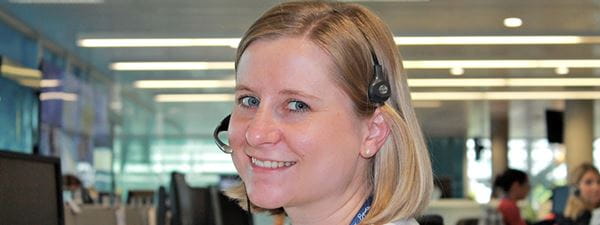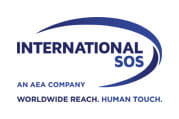A day in the life... of nurse Sarah Kong
Published: September 2014
Nurse Sarah Kong talks to Hotline (HL) about how her department makes client priorities their own and saves lives in the process.

HL: Can you give us an overview of the services you provide as a nurse at International SOS?
I joined International SOS three years ago and my role is to look after the American military and their family members across Europe, Africa and western Asia. I work alongside around 30 nurses in our London office, where we manage all medical assessments remotely over the phone. Speaking with a medical professional from a similar background is so important for clients who are working or travelling in an unfamiliar environment, and helps them overcome potential communication and cultural barriers to receive the same high quality healthcare assessment they expect back home.
Compared with my previous work in hospital settings, I now work with a much wider spectrum of medical scenarios and face new challenges every day. The variable level of healthcare facilities available in foreign countries can make matters much more complex. Thankfully we have a strong global network of healthcare providers that we can connect with in many areas, and these partners can update us on our clients’ wellbeing when additional care is needed. We have 24/7 access to a Senior Medical Director to assist us with more complicated situations. I always feel 100% supported.
HL: What unique skillset do you need to perform this role?
As a nurse working remotely, my main challenge is to provide a thorough assessment using only conversation to understand the patient’s condition. I don’t have any visual cues, so I have to think on my feet and gather crucial information from the patient or their representative on the other end of the phone. We’re always thinking about the best next step for the patient, whether that’s a local face-to-face assessment with an expert or urgent evacuation.
Sometimes the symptoms are very straightforward and we can advise on the best course of action without making any further referrals. This saves time for patients and ensures medical professionals on the ground are available to deal with more pressing medical emergencies. For us the most important thing to remember is that the client’s reason for calling is their utmost priority at that moment in their lives. Having a good listening ear and responding sensitively has a big impact on the way they feel during and after a call.
HL: Can you take us through the process of dealing with a new case?
In our initial phone assessment, it’s important to get a complete picture of the patient’s concern. We ask about the symptoms, how long they’ve been present, current medications and past medical history. Given many of our callers are frequent travellers, we also ask about their current location and any recent travel. This allows us to account for the possibility of diseases like malaria or yellow fever, if they’ve passed through affected regions.
We must also consider whether the patient is well enough for any upcoming travel, as it may be better to wait until their symptoms pass before travelling. Our expertise in this area is particularly important, especially as someone suffering with an ear or sinus infection is advised to postpone travel to prevent any serious pain or even rupturing of the eardrum due to pressure changes in a commercial aircraft.
HL: Do you receive further training to stay abreast of medical developments?
We have ongoing training via weekly medical team meetings. Our medical director Dr Ryan Copeland and members of the nursing team arrange for internal and external speakers to present on developments in different areas of medicine and nursing as well as changes to the medical situation in our core geographical regions. These meetings also give members of our team a chance to present their work on internal projects. I recently ran a review of our medical coding accuracy for cases, and it was important to update the team on any potential improvements.
Outside of work, there are other ways to develop our careers. The managers are very flexible and accommodating of training and academic development that relates to our roles. International SOS recently supported me as I completed a five-month Diploma in Tropical Nursing, during which I wrote a report soon to be published by The British Global and Travel Health Association. These successes help to emphasise how talented our team is, and remind me how proud I am of the work we do.
HL: That’s fantastic, congratulations. How will your diploma help you achieve more in your current role?
We cover a massive geographical region stretching from the west coast of Africa to the western side of Asia, so many clients could be exposed to tropical diseases. If someone does contract a disease in a tropical country, the symptoms can be misleadingly similar to the signs of general influenza.
For personnel who are deployed overseas and cover vast areas in a relatively short space of time, for example, there’s a chance they won’t develop symptoms until they arrive in a non-tropical country. Being able to identify possible exposure to a tropical disease from a client’s recent travel history can definitely help us make more informed medical recommendations.
HL: Do you recall any cases that highlight your value to International SOS clients?
I took one call involving a patient at sea who was suffering with intense abdominal pains, which turned out to be a burst stomach ulcer. Although the priority was to get him to land, I needed to maintain close contact with the medic on board to make sure his condition didn’t worsen. We were constantly on the lookout for serious complications like internal bleeding. Ultimately, it was our fast action, recommendations and constant monitoring that ensured the patient was evacuated, seen by an appropriate surgeon and restored to full health as quickly as possible.
HL: Finally, what do you like most about your job?
There are two things I really enjoy about working with International SOS. First, I’m lucky to work in a team where everyone has such an enthusiastic ‘can-do’ attitude to work and to life. Second, many of the clients we speak to are genuinely grateful for our assistance, which makes the job worthwhile and provides a constant source of positive reinforcement during a busy day!
The most important thing to remember is that the client’s reason for calling is their utmost priority at that moment in their lives. Having a good listening ear and responding sensitively has a big impact on the way they feel during and after a call.”



